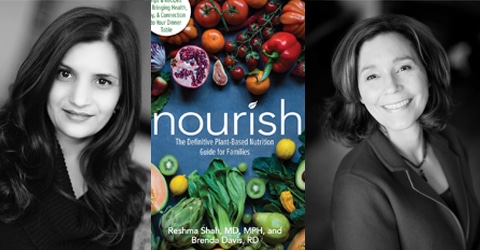

In the Center for Nutrition Studies’ upcoming Plant Forward Virtual Workshop Series, Dr. Shah will share her insights into how to make a whole food, plant-based diet sustainable for you and your family. Read more about her work and her most recent book, co-authored with Brenda Davis, RD.
Nutrition can be a controversial topic. Doctors, researchers, and media outlets seem to praise and ridicule all types of diet patterns, including keto, paleo, and even WFPB diets for general health. And when it comes to parenting and childhood health recommendations, things get even more complicated. Parents are eager to learn how to optimize the health and well-being of their children, but sifting through contradictory research can be a serious time commitment. And while several prominent medical experts work to distill information down into understandable videos and articles for the public, few focus on childhood nutrition. Luckily, Dr. Reshma Shah and Registered Dietitian Brenda Davis’ newest book, Nourish: The Definitive Nutrition Guide for Families, serves as a one-stop resource for families looking to dive deep into the science of a WFPB diet, as well as provide quick tips and recipes to satisfy children and adults alike.[1] Most importantly, before diving into the how, Davis and Dr. Shah explore the why, part of which is dispelling major myths that the public holds about plant-based diets and childhood.
Myth 1: Plant-Based Diets Put Children and Families at Risk of Nutritional Deficiencies
One main hesitation for families to adopt a plant-based diet is the fear of not getting adequate amounts of key nutrients without consuming meat and dairy. For children, especially, adequate amounts of calories, protein, fat, vitamins, and minerals are essential for proper cognitive and physical development.[2,3] However, multiple studies have shown that children who consume vegetarian and vegan diets have adequate nutrient intake and growth compared to reference populations.[4,5] Additionally, Dr. Shah notes that several reputable pediatric and nutrition organizations not only support the consumption of plant-based diets during pregnancy, infancy, and childhood, but also that “appropriately planned vegetarian diets are not only safe for children but may provide certain health advantages,”[1,6-11] including the Academy of Nutrition and Dietetics, the American Academy of Pediatrics, the Canadian Pediatric Society, the British Dietetic Association, the Australian Dietary Guidelines, and the Italian Society for Human Nutrition.[6-11]

The Academy of Nutrition and Dietetics does specify that vegetarian and vegan diets should be “well planned” to meet the needs of infants, children, and mothers.[6] But as Dr. Shah and Davis also emphasize, all diets, including those that contain meat and dairy, should be well planned in order to ensure adequate intake of energy and nutrients to support growth and development.[1] Therefore, the myth of inadequacy from a plant-based diet is no greater or more prevalent than any other pattern of eating.
Myth 2: Cow’s Milk Is Essential to Build Strong Bones in Children
A common concern for parents is getting their children adequate calcium on a plant-based diet in order for them to build strong bones. The current U.S. Dietary Guidelines for Americans (DGAs) recommends that children consume 2–3 servings of dairy per day.[12] These recommendations are based on rudimentary studies that determined how much milk was needed to replace daily calcium losses; however, high dairy intake has not been associated with beneficial health outcomes.[13] Additionally, countries with the highest consumption of dairy also have the highest frequency of bone fractures.[14] And with 70% of the global population being lactose intolerant (unable to digest the sugar lactose in milk),[15-17] it seems implausible to assume that dairy is the one, superior source of calcium for humans.

So, where should parents look for good sources of calcium for their children? Dr. Shah and Davis recommend consuming what many cultures have been consuming for centuries: calcium-set tofu, sesame seeds, and dark leafy greens. Fortified plant-based milks and orange juices are also reliable sources of calcium.[1] However, calcium is only one part of the story; Dr. Shah and Davis also note that exercise, sun exposure, and adequate intake of vitamin K, vitamin C, and folate are all crucial to good bone health.[1]
The Academy of Nutrition and Dietetics does specify that vegetarian and vegan diets should be “well planned” to meet the needs of infants, children, and mothers.[6] But as Dr. Shah and Davis also emphasize, all diets, including those that contain meat and dairy, should be well planned in order to ensure adequate intake of energy and nutrients to support growth and development.[1]
Myth 3: A WFPB Diet Will Provide All Necessary Nutrients for Growth and Development
While undoubtedly a WFPB diet provides adequate nutrition for growth and development, in our modern society, all diets need to be monitored for specific nutrients. Vitamin B12, a vitamin not produced by either animals or plants, is made by microorganisms in the soil. However, due to modern agricultural practices, there are few reliable plant-based sources of B12. Thus, it is important for plant-based eaters to supplement their diet with B12-fortified foods, such as fortified plant-based milks, cereals, and some brands of nutritional yeast. B12 supplements are also a great option.[1]
Furthermore, both children and adults are spending more and more time indoors. Sun exposure to our skin triggers our bodies to create vitamin D. However, the further one lives from the equator, the more difficult it is for their body to produce vitamin D. In fact, during the winter months, the sun’s angle makes it near impossible for a body to produce vitamin D in the Northern Hemisphere (anywhere above Dallas, Texas). So, Dr. Shah and Davis recommend including fortified plant milks, fortified orange juices, or a vitamin D3 supplement.[1]
More Than Just an Encyclopedia
Nourish: The Definitive Nutrition Guide for Families is so much more that the average plant-based nutrition book. Dr. Shah and Davis not only distill complex nutrition information into easily understandable chapters for parents and individuals, but the authors also provide practical advice and recipes to put the information into practice. A major takeaway is that, yes, a WFPB diet is one the best things a parent can give to their children, but health and well-being is so much more than that. Exercise, building relationships, and spending time with family are just as important to a child’s cognitive and physical development as what they eat. Because what is health without happiness, and what is happiness without enjoyment of food and family?
To learn more about plant-based diets for children and families, you can register for the Plant Forward Virtual Workshop Series, where Dr. Shah will speak about her expertise on the subject of whole food, plant-based diets.
References
- Shah R, Davis B. Nourish: The Definitive Plant-Based Nutrition Guide for Families. Boca Raton, Florida: Health Communications, Inc.; 2020.
- Rogol AD, Clark PA, Roemmich JN. Growth and pubertal development in children and adolescents: effects of diet and physical activity. Am J Clin Nutr. 2000;72(2 Suppl):521S-8S. doi:10.1093/ajcn/72.2.521S
- Gale CR, Martyn CN, Marriott LD, et al. Dietary patterns in infancy and cognitive and neuropsychological function in childhood. J Child Psychol Psychiatry. 2009;50(7):816-823. doi:10.1111/j.1469-7610.2008.02029.x
- O’Connell JM, Dibley MJ, Sierra J, Wallace B, Marks JS, Yip R. Growth of vegetarian children: The Farm Study. Pediatrics. 1989;84(3):475–481.
- Weder S, Hoffmann M, Becker K, Alexy U, Keller M. Energy, macronutrient intake, and anthropometrics of vegetarian, vegan, and omnivorous children (1−3 years) in Germany (VeChi Diet Study). Nutrients. 2019;11(4). doi:10.3390/nu11040832
- Melina V, Craig W, Levin S. Position of the academy of nutrition and dietetics: vegetarian diets. J Acad Nutr Diet. 2016;116(12):1970–1980. doi:10.1016/j.jand.2016.09.025
- Renda M, Fischer P. Vegetarian diets in children and adolescents. Pediatr Rev. 2009;30(1):e1-8. doi:10.1542/pir.30-1-e1
- Amit M. Vegetarian diets in children and adolescents. Paediatr Child Health. 2010;15(5):303-314. doi:10.1093/pch/15.5.303
- British Dietetic Association confirms well-planned vegan diets can support healthy living in people of all ages. The Association of UK Dietitians. https://essays.edubirdie.com/blog/british-dietetic-association-confirms-well-planned-vegan-diets-can-support-healthy-living-in-people-of-all-ages. Published August 7, 2017. Accessed July 26, 2021.
- National Health and Medical Research Council. Australian Dietary Guidelines. National Health and Medical Research Council; 2013.
- Agnoli C, Baroni L, Bertini I, et al. Position paper on vegetarian diets from the working group of the Italian Society of Human Nutrition. Nutr Metab Cardiovasc Dis. 2017;27(12):1037–1052. doi:10.1016/j.numecd.2017.10.020
- Dietary Guidelines for Americans, 2020-2025. 9th ed. U.S. Department of Agriculture and U.S. Department of Health and Human Services; 2020.
- Willett WC, Ludwig DS. Milk and Health. N Engl J Med. 2020;382(7):644–654. doi:10.1056/NEJMra1903547
- Malmir H, Larijani B, Esmaillzadeh A. Consumption of milk and dairy products and risk of osteoporosis and hip fracture: a systematic review and meta-analysis. Crit Rev Food Sci Nutr. 2020;60(10):1722-1737. doi:10.1080/10408398.2019.1590800
- Bayless TM, Brown E, Paige DM. Lactase non-persistence and lactose intolerance. Curr Gastroenterol Rep. 2017;19(5):23. doi:10.1007/s11894-017-0558-9
- Newcomer AD, Thomas PJ, McGill DB, Hofmann AF. Lactase deficiency: a common genetic trait of the American Indian. Gastroenterology. 1977;72(2):234–237.
- Srinivasan R, Minocha A. When to suspect lactose intolerance. Symptomatic, ethnic, and laboratory clues. Postgrad Med. 1998;104(3):109–111, 115. doi:10.3810/pgm.1998.09.577
Copyright 2025 Center for Nutrition Studies. All rights reserved.
Deepen Your Knowledge With Our
Plant-Based Nutrition
Certificate
Plant-Based Nutrition Certificate
- 23,000+ students
- 100% online, learn at your own pace
- No prerequisites
- Continuing education credits






